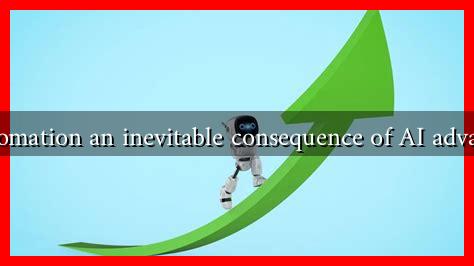-
Table of Contents
Is Job Automation an Inevitable Consequence of AI Advancement?
The rapid advancement of artificial intelligence (AI) has sparked a heated debate about its implications for the workforce. As machines become increasingly capable of performing tasks traditionally done by humans, the question arises: is job automation an inevitable consequence of AI advancement? This article explores the relationship between AI and job automation, examining the potential benefits, challenges, and the future of work in an AI-driven world.
The Rise of AI and Automation
AI technology has made significant strides in recent years, leading to the automation of various tasks across multiple industries. From manufacturing to customer service, AI systems are being deployed to enhance efficiency and reduce costs. According to a report by McKinsey, up to 800 million jobs could be displaced by automation by 2030, affecting nearly one-fifth of the global workforce.
Understanding Job Automation
Job automation refers to the use of technology to perform tasks that were previously carried out by human workers. This can range from simple repetitive tasks to complex decision-making processes. The following factors contribute to the rise of job automation:
- Technological Advancements: Innovations in machine learning, robotics, and natural language processing have made it possible for machines to perform tasks with increasing accuracy and efficiency.
- Cost Reduction: Businesses are motivated to adopt automation to lower labor costs and increase productivity.
- Changing Consumer Expectations: As consumers demand faster and more efficient services, companies are turning to AI to meet these needs.
Industries Most Affected by Automation
While automation has the potential to impact various sectors, some industries are more susceptible than others. Key sectors include:
- Manufacturing: Robotics and AI systems are increasingly used for assembly line tasks, reducing the need for human labor.
- Retail: Automated checkout systems and AI-driven inventory management are transforming the retail landscape.
- Transportation: The development of self-driving vehicles could revolutionize logistics and public transport, potentially displacing millions of driving jobs.
- Customer Service: AI chatbots and virtual assistants are handling customer inquiries, reducing the need for human representatives.
The Benefits of Automation
Despite the potential job losses, automation also brings several benefits that can enhance productivity and economic growth:
- Increased Efficiency: Automation can perform tasks faster and with fewer errors than humans, leading to higher output.
- Cost Savings: Businesses can save on labor costs and allocate resources to other areas, such as research and development.
- Job Creation in New Areas: While some jobs may be lost, new roles in AI development, maintenance, and oversight are likely to emerge.
Challenges and Concerns
While the benefits of automation are clear, there are significant challenges and concerns that must be addressed:
- Job Displacement: Many workers may find themselves without jobs, leading to economic instability and increased inequality.
- Skill Gaps: The workforce may not have the necessary skills to transition into new roles created by automation.
- Ethical Considerations: The use of AI raises ethical questions about decision-making, privacy, and accountability.
The Future of Work in an AI-Driven World
The future of work will likely involve a hybrid model where humans and machines collaborate. Rather than viewing automation as a threat, it can be seen as an opportunity for workers to focus on more complex and creative tasks. Companies and governments must invest in education and training programs to equip the workforce with the skills needed for the jobs of the future.
For more insights on the impact of AI on jobs, you can visit McKinsey’s Future of Work page.
Conclusion
In conclusion, job automation is indeed a significant consequence of AI advancement, but it is not an inevitable doom for the workforce. While certain jobs may be displaced, new opportunities will arise, and the nature of work will evolve. By embracing change and investing in education and training, society can navigate the challenges posed by automation and harness its potential for economic growth and innovation. The key lies in adapting to the new landscape and ensuring that workers are prepared for the future of work.

